
All the organics recycling information you need. Find a drop-off site, ensure quality, and more.
SET up for Success
With help from many sustainability experts across the State of MN, SET has been instrumental in making MN one of the leaders of the nation in organics recycling. By working with haulers, landfills, legislators, city and county staff, the U of MN and compostable product manufacturers we have helped divert significant amounts of wasted resources and reduced GHG emissions drastically. We can help make collection programs in your area a success. Some of the programs below also have great resources for those wanting to start organic food diversion for composting.
Dakota County Organics Program
Specialized Environmental Technologies, Inc. and The Mulch Store offers residential drop-off service at the Empire compost facility. This drop-off program began in 2019 in partnership with Dakota County. The use of this site is open to all Dakota County residents. The drop-off service, along with compostable bags, are provided for free by SET.
All the material received is processed on-site at the compost facility. You can officially sign up for the service through Dakota County and learn more about the program.
Minneapolis Organics Program
The Minneapolis Organics program has won awards and been recognized as one of the most successful opt-in organics programs in the country. With very diverse education and outreach programs to inform its population, they have continuously achieved a contamination rate of less than 1% when collecting food residuals in their program. You can officially sign up for the service through Minneapolis and learn more about the program.
Minnesota Composting Council Program
The MNCC lists many of the programs across the state. SET has had an employee on the MNCC board of directors since its inception. We are a continuous donor and supporter of this non-profit group dedicated to the advancement of composting throughout the State based on sound science and research. Check out the many collection programs that are available around the State and become a member today to support their efforts!
Organics Diversion
Organics diversion programs can be slightly different across the State but they all have one common goal. Remove as much of the organic portion of our waste stream out of our current solid waste management systems. This helps eliminate the methane gases they produce and repurposes the valuable resources they provide to benefit the environment. It will also help divert up to 75% of the waste stream from being landfilled in the first place when combined with traditional recycling programs.
Keeping the organics free of contamination so that it can be made into a beneficial end product called compost is key to a successful program so that the loop can be closed for a more sustainable society. While collection programs are not available in all areas currently, they are gaining traction across the State. Contact your local haulers, cities and representatives to get it started in your area today!
Frequently Asked Questions
Best general principal: Only something that was recently living can be composted—if any part of it wasn’t, don’t put it in the organics recovery bin.
Can I dispose of paper towels with disinfectant?
Only paper towels used for food cleanup should be included in the organics due to cleaning products or chemicals that could potentially not break down during the composting process.
Can I dispose of cloth, fabric, and textiles?
At this time we do not accept these materials. Woven fabric doesn’t break down quickly enough to work in our processes and differentiating between synthetic blends and natural cotton or wools along with water repellant coatings can contaminate finished compost.
Can I dispose of materials treated with herbicides or pesticides?
Due to the persistence of some chemicals in these products in the environment we ask that these materials be kept out of the compost system. They can have adverse effects on plant growth and the microbes we rely upon to break down the resources.
Can I dispose of animal bedding?
Animal bedding such as wood chips or shavings, shredded newspaper, coconut coir, or other bedding material types are not currently permitted, and should not be placed in the organics waste stream.
Can I dispose of dog/pet waste?
No, current commercial composting regulations prohibit the inclusion of pet waste.
Can I dispose of liquids?
Bulk liquids are not accepted in the organics recycling, however incidental amounts are ok. Wiped up spills with milk or juice on a paper towel are allowed, anything that can’t be held by only a compostable bag should be dumped down the drain.
Can I dispose of cooking oil or grease?
Bulk grease and oil is not accepted in any containment system, but trace amounts such as oil in a frying pan wiped with a paper towel or bacon grease is acceptable. If a compostable bag will not hold it by itself, put it in the trash.
Can I dispose of paper towels with disinfectants or chemicals?
Only paper towels using a natural disinfectant like vinegar or alcohol for food clean up should be included in the organics. If chemical cleaners are on the paper towel, it should go in the trash. Any paper towels that have been used to clean up pet waste, motor oil, or anything not related to food should also be tossed in the trash.
Can I dispose of facial tissues and paper towels used to clean makeup or personal hygiene products?
SET will only accept plain, additive free paper facial tissues. Any facial tissues containing various soothing lotions, perfumes, disinfectants, or any other additives should be placed in the trash. Tissues used to remove makeup should also be put in the trash since it is unknown what chemicals are used in the products and whether or not the products will biodegrade.
Can I dispose of wet wipes?
No, wet wipes often contain fragrances and chemicals for disinfecting. In addition, wet wipes are often made up of woven fibers that make them much more difficult to break down in the composting process.
Can I dispose of decorative tissue paper and crepe paper?
When asking about tissue paper being compostable, the answer is “it depends”. Most tissue papers could be composted as long as it is foil and plastic free. If it has glitter, glues, dyes, foil or a shiny coating it should be thrown in the trash. Due to the lack of properly identifying whether each type of tissue paper is safe to compost and also since it is not a food related item, we prefer if you keep it out of the compost bin.
Encourage your lawmakers to properly label materials that meet compostable BPI standards so that composters can be certain that products are safe for the environment and their compost piles!
Can I dispose of cloth, fabric, and textiles?
SET does not accept textiles for organics recovery. Woven fabric doesn’t break down quickly enough in the process to avoid being screened out. In addition, fabric materials can get wrapped around the moving parts of equipment causing significant downtime to cut out the materials and some fabric may have additives or residuals that may not fully break down.
Can I dispose of packaged food?
At this time, SET does not have the equipment that is necessary to separate food from packaging but is working on technology that may change that someday. Any food disposed of as organics needs to be removed from packaging at this time.
Can I dispose of animal bedding?
Animal bedding such as wood chips or shavings, shredded newspaper, coconut coir, or other bedding material types are not currently permitted at SET, and should not be placed in the organics waste stream if your organics is processed at a SET facility.
Can I dispose of dog/pet waste?
Current commercial composting regulations prohibit the inclusion of pet waste.
Can I dispose of plastic or wax lined cardboard boxes, freezer boxes or juice/ milk cartons, takeout pails, etc.?
No, these containers have a plastic coating or lining that is not BPI certified. This means there will be plastic fragments left in the finished compost. The paper inside these coated items will break down leaving the coating behind.
Can I dispose of molded fiber plates and bowls?
Molded fiber foodservice ware needs to be BPI certified compostable in order to compost. The majority of molded paper items currently use a PFAS chemical for grease/oil/moisture barrier. The addition of PFAS chemicals in food packaging or service ware results in costly expenses at composting facilities to manage water coming into contact with active composting piles. The food-service industry is just starting to manufacture molded paper items without added PFAS chemicals in it.
Can I dispose of carcasses?
Animal carcasses are not currently allowed at the SET organics processing facility unless special approval is granted by the Minnesota Pollution Control Agency.
Can I dispose of carved or decorated pumpkins?
When you’re done with your carved pumpkins and other gourds, you can put them in the organics recycling cart. Remember to remove any candles or lights first!
Added synthetic materials such as paint, glitter, permanent marker, stickers or jewels make pumpkins non-compostable. Either the whole pumpkin should go in the trash, or the decorative portions should be cut off (the removed parts should go in the trash) prior to composting.
Remember; permanent markers, paints, and other synthetic decorations will not break down in the composting process either and could contaminate the finished product. While there would be miniscule amounts of these chemicals on just one pumpkin, we highly discourage adding anything to the process that could potentially harm the environment or human health. Cutting off the skin of the pumpkin and disposing of that portion in the trash is recommended, the remaining can be composted.
Can I dispose of fallen fruit and unharvested foods?
If it’s a small amount of fruits and vegetables raked up in the yard and garden, it’s ok to include in the yard waste collection or yard waste drop-off. If it’s a large amount, the best option is to separate them from yard waste as best you can and dispose of with food scraps/organics.
Can I dispose of Christmas trees and wreaths?
Wreaths should only be disposed of at a permitted compost facility that monitors temperatures to ensure any potential plant diseases or pests are killed in the process. Check with your hauler or municipality for guidance, as different communities manage brush and yard waste differently. Make sure the wreath is free of any wires, lights, ribbon, and other decorations before disposal.
Trees must also be free from any lights, ornaments, tinsel, flocking, or other decorations.
SET is all about organics:


